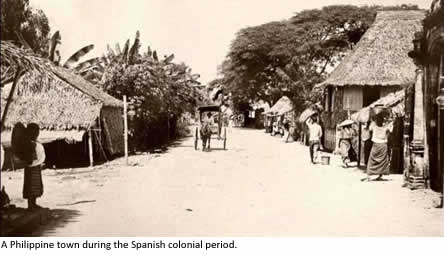
In our view, it is the 400-plus years of Spanish colonization that molded the Filipino persona into what it is today. Spain needed a mellow, compliant, non-combative populace that it could easily control given the overwhelming numbers of "natives" versus their colonial masters.
With the help of the Catholic Church, the Filipino was slowly and meticulously molded to become, less ambitious, marginally educated, more superstitious, and overly religious. The result was that over the course of four centuries, Spain was able to create a population that gave them a minimal amount of trouble, could be easily pacified, demanded little, and remained extremely loyal. This allowed just a handful of Spanish colonials to control the entire archipelago.
The status quo work well for Spaniards as well as Filipinos at the time. The Spaniards ruled with minimal effort, and Filipinos lived reasonably "contented" lives so long as they kept to their place in society.
But those skills and character traits that allowed Filipinos to live though the Spanish colonial period no longer work for the today's Filipinos who now must run their country and compete in a highly globalized world.
For instance, during the Spanish times, Filipinos were forced to be underachievers. Those who spoke out like Jose Rizal, or showed too much drive or ambition suffered grave consequences. Thus 400 years of such programming eventually turned most Filipinos into the underachievers they are today.
Here's just one example: In the 1970s, government and business leaders wanted to turn the Philippines into a global automobile manufacturing powerhouse. Using Ferdinand Marcos' dictatorial powers, they rammed though a government program called the Progressive Car Manufacturing Program (PCMP) in 1973. The PCMP's, mildly ambitious aim was to build small cars and trucks in the Philippines, with ever increasing local content and later on begin exporting them across Asia (Marcos detractors however suspected it was secretly aimed at helping replenish the empty government coffers that Marcos and his cronies systematically looted).
So you ask, where is the Philippine automobile manufacturing industry today? Basically where it was in the 70s. In 45 years the Philippine car manufacturing industry has essentially gone nowhere. The grandiose goal of using the PCMP to jumpstart a full-fledged Philippine car manufacturing industry fizzled away into nothing. Meanwhile automobile brands like Hyundai or Kia that weren't even around in 1973 are now global brands. Even today, the Indian brand Tata is making inroads into the Philippine Market. And Tata automobiles were not around even just a decade ago.
Sadly, as a culture we just don't have it in us to excel. Sure there are exceptions, but they are so few and far between that they don't even make a dent.
Buy most Philippine-made products and the workmanship and quality leaves much to be desired. They lack the craftsmanship of American, German or Japanese products. It is only when foreign manufacturers set up factories in the Philippines and produce goods using their own processes and quality control standards that one will find locally made products that are well made. But if it is a Filipino company, run by Filipinos, you are more likely than not to find a sub-standard product.
And most Filipinos readily accept poor quality products—or services—as the norm. They hardly complain or demand they get better quality or better service. Mediocrity is just fine with most of them. Centuries of living under Spain taught them to be that way. And for the few who insist on quality, they buy imported products because locally made ones will never do.
You see mediocrity, timidity, complacency even laziness everywhere in the Philippines: in the schools; in government—locally and nationally; in offices and businesses; and in everyday people you meet on the street.
We at PNL don't want to appear overly critical in this editorial but we believe that admitting that there is a problem is the first step in finding a fix. Deluding oneself into believing that everything is fine and dandy—so lets just talk about how great we Filipinos are—only kicks the can down the road. And when you do that, you just hand over the problem to your children. Because they will have to deal with it when their time comes.
Filipinos must break out of the box the Spaniards spent four centuries enclosing them in. They have to get rid of the traits that have been seared into their brains by the Spanish conquistadores and their fraile lackeys. Some traits would be hard to shed because they almost define us as a people. For example we must become less forgiving, less complacent and stand up for our rights more. We have to become less patient, more driven, more focused and less easy-going. We must demand more from ourselves and from everyone around us. Mediocrity must no longer be tolerated. Filipinos need to grow a "backbone" quickly, become more assertive, and realize that we are now in charge of our own destiny. Traits that once served Filipinos well under the yoke of their Spanish colonizers, have now become major impediments and prevent the country from moving forward. We Filipinos must now reengineer ourselves and create a totally new Filipino. Published 11/09/2015


No comments:
Post a Comment